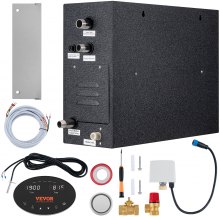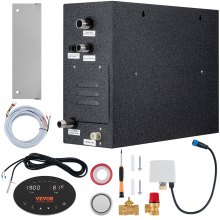VEVOR Unleashing the Potential of Steam Generators in Industries
The industrial importance of steam engines cannot be overstated. Steam is a versatile component that enables many critical applications in various industries, from powering turbines to heating systems. However, efficient steam production depends on reliability and equipment efficiency.
This is where VEVOR stands out as a beacon of excellence, poised to revolutionize industrial practice with its innovative water heater solutions. VEVOR's steam generators stand out as performance models, combined with the simplicity of the existing system and increased operational efficiency. They are, therefore, indispensable assets, facilitating lean operations while paving the way for a more sustainable future.
What Does A Steam Generator Do?
A steam generator is a device that converts water into steam by the application of heat. Its primary business is producing cooling water for industrial, commercial, and residential applications. Here is an explanation of what a steam generator is.
Steam Production
Once water reaches its boiling point, it produces steam. Generally, the hot water produced by the generator is at higher pressures and temperatures, depending on the intended use. Steam characteristics, pressure, and temperature requirements vary widely depending on the operation and process.
Power Generation
In power plants, generators play an important role in generating electricity. The steam the generator produces is used to power turbines, which turn the generator into electricity. This phenomenon is common in thermal power plants, where fossil fuels or nuclear power are used to heat water.
Industrial Processes
Steam heaters are important in various industrial processes where steam is used as a source of heat or a means of transferring energy to Industries such as food processing, pharmaceutical manufacturing, pharmaceuticals, textiles, and pulp paper rely on steam for evaporation, sterilization, drying, and other applications.
Heating and Climate Control
Steam generators are also used for heating in commercial and residential areas. For example, steam boilers are commonly used to heat buildings, hospitals, schools, and hotels. Steam can also be used in HVSC systems to control humidity and temperature.
Cleaning and Sterilization
Steam effectively sterilizes surfaces due to its high temperature and ability to penetrate porous materials. Steam generators are used in healthcare, hospitality, and construction industries to sterilize equipment, disinfect surfaces, and clean machinery and equipment.
Essential Accessories For Steam Generators
Steam generators are powerful machines that can be upgraded with various accessories to improve efficiency, ensure safety, and enhance efficiency. Here are some of the important components commonly used in steam engines.
Pressure and Temperature Gauges
These devices monitor the pressure and temperature levels of the steam generator, allowing users to maintain optimal operating conditions and prevent overpressure conditions.
Safety Valves
Safety valves are essential components that simply relieve excessive pressure from the steam generator to prevent potential explosions or damage. They provide the necessary safety measures to protect equipment and personnel.
Water Level Controls
Water level control monitors the water level in the steam generator and regulates the flow to maintain safe operation. Properly controlled water levels are important to maintain hydration and prevent condensation.
Automatic Blowdown Systems
Periodically, the blowing system washes a portion of the boiler water to help remove dirt and sludge buildup from the boiler. The automatic blowdown system improves water quality, reduces scaling, and extends the life of the steam generator.
How To Maintain Your Steam Generator for Optimal Performance
Proper steam turbine maintenance is essential to ensure proper operation, extend life, and prevent costly maintenance or downtime. Here are some basic tips for maintaining your steam generator:
Water Quality Management
Maintain adequate humidity using demineralized or treated water to reduce scale buildup and corrosion in the steam generator. Install water softeners, filtration, and chemical treatment systems to prevent contamination and maintain water chemistry within acceptable limits.
Cleaning and Descaling
Periodically drain the cold water evaporator flush and dehumidify to remove mineral deposits, scale, and sediment. Follow the manufacturer’s recommendations for cleaning procedures and use appropriate cleaning agents or solvents.
Blowdown Procedures
Regular ventilation removes dirt, sediment, and sediment from boiler water. Proper grinding helps improve water quality, prevent spoilage and spoilage, and improve the water heater's efficiency.
Pressure and Temperature Control
Monitor and control pressure and temperature levels in the steam generator to prevent overpressure conditions and ensure proper operation. Install pressure relief valves, temperature gauges, and control systems to maintain optimal operating conditions.
Why Choose VEVOR’s Steam Generators?
Steam machines offer many benefits across industries and various applications. They are versatile, clean energy options that enable efficient energy conversion across various industries. Steam generators are efficient in producing steam at high temperatures.
As such, they are worthy investments that everyone must carefully consider before buying. Not only does your steam generator have to be durable and have the necessary technology, but it must also come from customer-centric manufacturers with great warranties.
Considering all these necessities, VEVOR’s steam generators are answered prayers. They enable you to get excellent quality for competitive prices.
FAQs About Steam Generators
What are the different types of steam generators?
Steam generators can be classified into different types based on design, fuel source, and application. Typical applications include fire-tube boilers, water-tube boilers, electric steam boilers, and solar water heaters.
Are steam generators environmentally friendly?
Steam generators can be environmentally friendly depending on factors such as fuel type, energy efficiency, emission control measures, integration of renewable energy, and more.
What are some common problems associated with steam generators?
Common problems with steam generators include scaling and corrosion, leaks, pressure fluctuations, steam quality issues, and steam quality malfunctions in safety equipment. Prompt troubleshooting, maintenance, and repairs are needed to prevent these problems and ensure proper operation.


































































